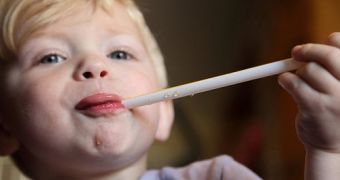A new study showed that most children consume caffeine on a daily basis and this affects them in a very negative way, being responsible for their poor sleep quality and even for bed wetting.
The major problem for parents and pediatricians is that there is not enough information on childhood caffeine consumption, and most parents haven't the slightest clue of the amount or effects of their child's caffeine consumption.
Dr. William Warzak and colleagues from the University of Nebraska Medical Center, conducted a survey on the parents of over 200 children, 5 to 12 years old, during their routine clinical visits at an urban pediatric clinic.
They asked the parents to report what kind of snacks and beverages their child consumed on a daily basis, and how much.
The results concluded that 75% of children surveyed consumed caffeine on a daily basis, and the more caffeine they ingested, the less sleep they got.
“Some children as young as 5 years old were consuming the equivalent of a can of soda a day,” said Dr. Warzak.
Also, older kids drank more caffeine-containing beverages than others, and, according to Dr. Warzak, “children between the ages of 8 and 12 years consumed an average of 109 mg a day, the equivalent of almost 3 12-ounce cans of soda.”
However, as far as this age category is concerned, there was no link found between caffeine and bed wetting.
Dr. Evans, coauthor and statistician, said that “contrary to popular belief, children were not more likely to wet the bed if they consumed caffeine, despite the fact that caffeine is a diuretic.”
The most important advice given by the authors of this study is for parents to monitor their children's caffeine consumption.
They “should be aware of the potentially negative influence of caffeine on a child's sleep quality and daily functioning,” Dr. Warzak stressed.
Also, a helping hand could be coming from primary care pediatricians, who should be able to help by screening patients for caffeine consumption and educating parents about the potentially harmful effects of caffeine.
The study appears in The Journal of Pediatrics.

 14 DAY TRIAL //
14 DAY TRIAL //